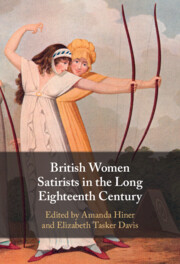Book contents
- British Women Satirists in the Long Eighteenth Century
- British Women Satirists in the Long Eighteenth Century
- Copyright page
- Dedication
- Contents
- Illustrations
- Notes on Contributors
- Acknowledgements
- Introduction
- Part I Traditions and Breaks
- Part II Publicity and Print Culture
- Part III Moral Debates and Satiric Dialogue
- Chapter 10 Anne Finch, Anna Seward, and Women’s Relation to Formal Verse Satire in the Long Eighteenth Century
- Chapter 11 Satire as Gossip
- Chapter 12 “An invisible Spy”
- Chapter 13 Austen’s Menippean Experiments
- Appendix Selected List of Eighteenth-Century Women Writers and Their Satiric Works
- Selected Bibliography and Guide to Further Reading
- Index
Chapter 10 - Anne Finch, Anna Seward, and Women’s Relation to Formal Verse Satire in the Long Eighteenth Century
from Part III - Moral Debates and Satiric Dialogue
Published online by Cambridge University Press: 31 March 2022
- British Women Satirists in the Long Eighteenth Century
- British Women Satirists in the Long Eighteenth Century
- Copyright page
- Dedication
- Contents
- Illustrations
- Notes on Contributors
- Acknowledgements
- Introduction
- Part I Traditions and Breaks
- Part II Publicity and Print Culture
- Part III Moral Debates and Satiric Dialogue
- Chapter 10 Anne Finch, Anna Seward, and Women’s Relation to Formal Verse Satire in the Long Eighteenth Century
- Chapter 11 Satire as Gossip
- Chapter 12 “An invisible Spy”
- Chapter 13 Austen’s Menippean Experiments
- Appendix Selected List of Eighteenth-Century Women Writers and Their Satiric Works
- Selected Bibliography and Guide to Further Reading
- Index
Summary
Eighteenth-century women writers excelled in the formal satiric style associated by contemporaries with the Roman poet Horace. While formal verse satire was especially fashionable in mid-century, two accomplished poets illustrate the rise and decline of this phenomenon. Anne Finch (1661–1720), writing at the beginning of the satiric vogue, professed to hate satire but incorporated corrective criticism into many poems; she wrote only one formal verse satire and kept it in manuscript. Anna Seward (1742–1809), who identified herself as a poet of sensibility, wrote satirically in prose but rarely produced formal satiric verse. Like Finch, Seward kept her sole formal satiric poem in manuscript until authorizing its posthumous publication. Finch exemplifies how a woman might hesitate to write in the Roman style because Restoration satire was a “masculine” poetic form associated with classical education, public affairs, and personal invective. Seward illustrates why a late-century poet might have moved away from formal verse satire despite a predilection for its tone and purpose. Both poets show how women readily adapted the poetic fashions of their lifetimes to suit their satiric purposes.
- Type
- Chapter
- Information
- British Women Satirists in the Long Eighteenth Century , pp. 191 - 206Publisher: Cambridge University PressPrint publication year: 2022



